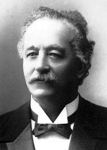Few peace advocates know the name Elie Ducommun. For this reason, a two-day history seminar was held in Geneva to explore the life of the remarkable Swiss politician who won the Nobel Peace Prize in 1902, together with IPB’s second Secretary-General, Albert Gobat. The ‘Ducommun Committee’ decided to invite specialists from several countries to offer analyses of Ducommun’s role in many fields.
Prof Irwin Abrams (USA, expert on Nobel Peace Prize) spoke about the origins of the IPB and his explorations in our archives in the 1930s;
Arthur Eyffinger (Netherlands, former head librarian at the Peace Palace) compared The Hague and Geneva as centres of internationalism;
Anne Kjelling (Norway, Nobel Institute) talked about Ducommun’s relationship with the Nobel Committee;
Peter van den Dungen (Netherlands, Bradford Univ) showed slides of the Museum of War and Peace set up by the Polish entrepreneur and peace advocate Jean de Bloch – a project supported by IPB and Ducommun;
Various Swiss experts explored Ducommun’s role as a politician, journalist, railway administrator and freemason.
Verdiana Grossi summed up with an excellent speech on theme of social engagement.
On the Friday evening we were treated to a lecture by German historian Karl Holl on another Nobel Peace laureate (and leading IPB figure before World War 2) Ludwig Quidde, who died in exile in Geneva in 1941.
On the Saturday afternoon a group of us visited various sites in the Geneva region, including the tomb of Quidde, the bust of Ducommun and the obelisk to peace erected by Jean-Jacques de Sellon in 1830 – probably the earliest peace monument in Europe.
A variety of literature is available for those interested in knowing more about this fascinating area of study, including a bibliography of works by and about Ducommun.
An anthology entitled “Elie Ducommun 1833-1906” is available from IPB Secretariat. The material is mostly in French, with one chapter in English.

